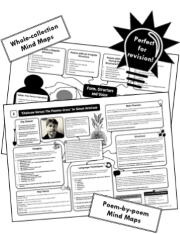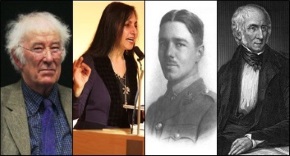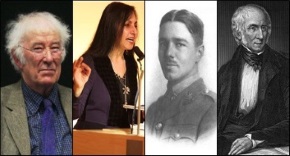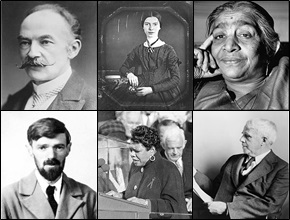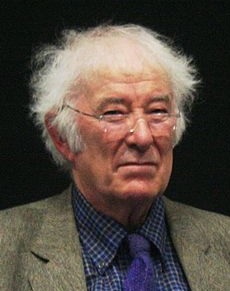
Heaney, Seamus
In 2009 two-thirds of the poetry collections sold in the UK were by Seamus Heaney, and since his death in 2013 he has remained one of the most popular poets in the English language. Heaney’s work has been admired since the appearance in 1966 of his first poetry collection, ‘Death of a Naturalist’, which achieved immediate success. Heaney’s appreciation by the general public has been accompanied by praise from critics and scholars. His many literary prizes culminated in the award of the Nobel Prize for Literature of 1995, ‘for works of lyrical beauty and ethical depth, which exalt everyday miracles and the living past’.Seamus Heaney was born in 1939 at a small farm in County Derry (also known as County Londonderry), Northern Ireland, where he lived until he was 14, when the family moved to another farm nearby. Heaney was very conscious of his background; his nationality, Irish Catholic identity and rural upbringing all feature strongly in his poems.
Seamus Heaney’s enduring popularity can be explained by his accessible subject matter and engaging style. Many of his best-loved poems deal with everyday childhood memories, such as ‘Blackberry-Picking’, or old farming practices, such as ‘Churning-Day’ in which he remembers his mother making butter by hand. However, there is nothing sentimental in Heaney’s poetry, and Heaney’s combination of vivid realism and subtle ideas owes a lot to his cultural heritage and education. He took his influences from both popular sources – what he has called the ‘roadside rhymes’ and ‘ordinary rituals of life’ – and the excellent formal education that he received. Heaney was part of the first generation of talented young working-class people in Northern Ireland able to gain a free academic education by passing a grammar school entrance examination. He made good use of his opportunity, progressing to Queen’s University in Belfast, where he studied English Language and Literature and gained a first class honours degree – a rare achievement at that time. This heritage allowed Heaney to combine a familiarity with the realities of rural life and nature with an intimate knowledge of the best of classical, Irish Gaelic and English language literature. The influences upon his work range from Irish legends and Anglo-Saxon sagas to Wordsworth and the Romantic poets to and contemporary poets such as Patrick Kavanagh and Ted Hughes.
In 1965 Seamus Heaney married fellow writer Marie Devlin. Living in Belfast in the 1970s in Northern Ireland Heaney inevitably found himself in the midst of the Troubles – the violent political and social conflict between the Catholic and Protestant communities which took place between 1969 and 1998. Few of Heaney’s poems written in this context are directly about the conflict; he chose instead to comment metaphorically – and powerfully – comparing the violence of the period to that inflicted on individuals in past historical periods, in poems such as ‘Punishment’.
In 1972 Heaney moved from Northern Ireland to live in the Irish Republic, working first as a freelance writer and also taking up a variety of University appointments, including periods at Harvard (USA) and Oxford. He continued to publish collections of poetry – all of which were well received – until his death in 2013. His later work was less directly personal than his earlier poems, exploring wider themes – including philosophy and politics – and drawing upon classical and mythological sources. Heaney is the also the author of several translations, including the Anglo-Saxon epic poem ‘Beowulf’ published in 2000.
A collection of Seamus Heaney’s poems taken from all his work was published in 2018, titled ‘100 Poems’. Heaney had planned the book himself, and after his death the collection was selected by his wife and family. The words of his daughter, Catherine, in her introduction refer to the ‘extraordinary … power and vitality’ of her father’s work: a succinct and fitting epitaph.
© ZigZag Education 2026: content may be used by students for educational use if this page is referenced.
Show / hide details
| 13th April 1939 |
Heaney born on a farm near Castledawson in Northern Ireland
|
|
| 1945–1951 |
Attended primary school
|
|
| 1951–1957 |
Won a scholarship to St Columb’s College, Derry
|
|
| 1953 |
Heaney’s brother Christopher died in a car accident
|
|
| 1957–1961 |
Achieved a first class degree in English from Queen’s University, Belfast
|
|
| 1963 |
Joined the Belfast Group
|
|
| 1965 |
Married
|
|
| 1966 |
University teaching post
|
|
| 1966 |
Death of a Naturalist published
|
|
| 1968 |
Birth of Heaney’s second child
|
|
| 1969 |
Another poetry collection published
|
|
| 1975 |
North published
|
|
| 1979 |
A further poetry collection published
|
|
| 1984 |
Mother’s death
|
|
| 1987 |
Father’s death
|
|
| 1989 |
Elected Professor of Poetry
|
|
| 1995 |
Nobel Prize
|
|
| 2003 |
Praise for rapper
|
|
| 2006 |
Stroke
|
|
| 2009 |
Further award
|
|
| 2010 |
Human Chain published
|
|
| 2013 |
Death
|



